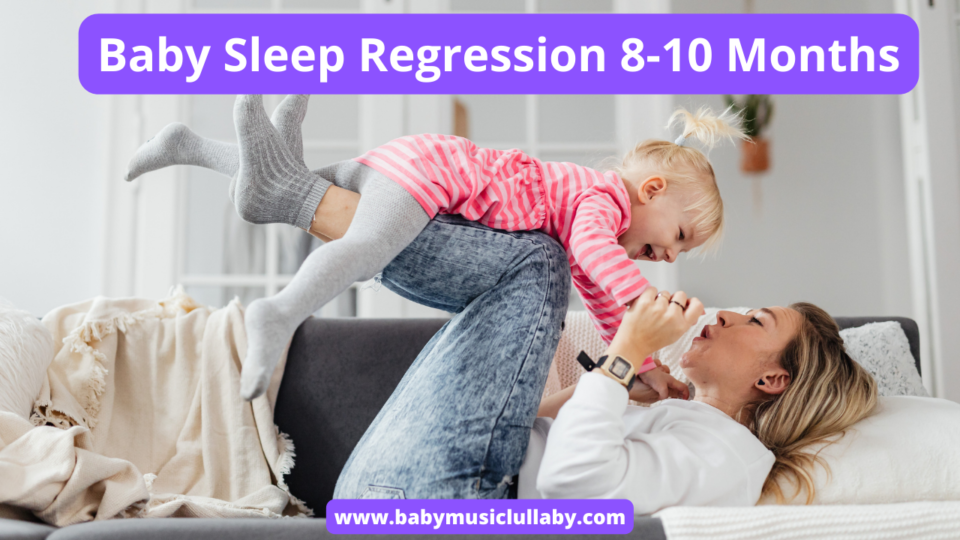Contents
Introduction
The journey of parenting is full of beautiful moments and challenges, and one common challenge that many parents face is sleep regression. Sleep regression refers to a period when a baby’s sleep patterns temporarily disrupt and regress. One particular phase that can be challenging for both babies and parents is the 8-10 month sleep regression. In this article, we will explore this specific sleep regression phase, provide insights into its causes, offer strategies for managing it, and address frequently asked questions to help you navigate through this stage successfully.
What is Sleep Regression?
Sleep regression is a temporary disruption in a baby’s sleep patterns. It is often characterized by changes in sleep duration, frequent night wakings, difficulties falling asleep, and overall sleep disturbances. Sleep regressions are common and occur during various stages of a baby’s development.
8-10 Month Sleep Regression: Causes and Signs
The 8-10 month sleep regression can be attributed to several factors that coincide with significant developmental milestones:
- Cognitive Development: Around this age, babies undergo rapid cognitive development. They may be learning new skills such as crawling, sitting up, or even attempting to pull themselves up, which can lead to increased restlessness during sleep.
- Separation Anxiety: Separation anxiety tends to peak between 8-10 months. Babies become more aware of their surroundings and form strong attachments to their caregivers. This newfound awareness and attachment can cause anxiety when separated, making it difficult for them to settle down and sleep.
- Teething: Teething can be another contributing factor to sleep regression. The discomfort and pain associated with teething can disrupt a baby’s sleep, leading to more frequent waking and restlessness.
Signs of sleep regression during this phase may include:
- Increased night wakings.
- Difficulty falling asleep and increased fussiness at bedtime.
- Shorter and fragmented naps.
- Increased reliance on sleep associations, such as rocking or feeding, to fall back asleep.
Strategies for Managing Sleep Regression
While sleep regression can be challenging, there are strategies that can help you and your baby navigate through this phase:
- Establish a Consistent Bedtime Routine: A consistent bedtime routine helps signal to your baby that it’s time to wind down and prepare for sleep. Include calming activities such as a warm bath, soothing music, or a gentle massage to create a relaxing environment.
- Encourage Independent Sleep Skills: Help your baby develop self-soothing skills by allowing them to settle themselves back to sleep when they wake up during the night. Gradually reduce sleep associations such as rocking or feeding to sleep, promoting independent sleep skills.
- Create a Comfortable Sleep Environment: Ensure that your baby’s sleep environment is conducive to sleep. Maintain a cool, quiet, and dark room. Consider using a white noise machine to drown out external sounds that may disturb their sleep.
- Offer Comfort and Reassurance: When your baby wakes up during the night, provide comfort and reassurance without immediately resorting to picking them up or feeding. Gentle patting, shushing, or offering a favorite blanket can help soothe them back to sleep.
- Adjust the Schedule if Necessary: Evaluate your baby’s sleep schedule and adjust it if needed. Pay attention to their wake times and ensure they are getting enough daytime sleep to prevent overtiredness, which can contribute to sleep disturbances.
- Practice Consistency: Be consistent with your approach to sleep and stick to the strategies you choose. Babies thrive on predictability, and consistent routines can help them feel secure and calm.
Frequently Asked Questions
- Q: Is sleep regression at 8-10 months temporary? A: Yes, sleep regression at this age is temporary and typically lasts for a few weeks to a couple of months.
- Q: How can I help my baby sleep better during this regression phase? A: Focus on establishing a consistent bedtime routine, promoting independent sleep skills, and creating a comfortable sleep environment.
- Q: Should I change my baby’s sleep schedule during sleep regression? A: While some adjustments may be necessary, it’s important to maintain a consistent sleep schedule as much as possible to provide stability and routine.
- Q: Is sleep regression a sign of a sleep problem? A: Sleep regression is a normal part of a baby’s development and is not necessarily indicative of a long-term sleep problem.
- Q: Can teething cause sleep regression? A: Teething can contribute to sleep disturbances and may be a factor during sleep regression phases. Providing comfort measures for teething pain can help alleviate some of the sleep disruptions.
- Q: When should I seek professional help for sleep regression? A: If sleep regression persists for an extended period, significantly affects your baby’s well-being or development, or causes excessive distress for your family, it may be beneficial to consult with a pediatrician or sleep specialist.

Conclusion
The 8-10 month sleep regression can be a challenging time for both babies and parents. Understanding the causes and signs of this regression phase, along with implementing appropriate strategies, can help alleviate some of the sleep disruptions and provide a more peaceful sleep environment for everyone involved. Remember that sleep regressions are temporary, and with patience, consistency, and support, you and your baby can navigate through this phase successfully.

 Subscribe to Get Soothing Lullabies to Help Your Baby to Sleep
Subscribe to Get Soothing Lullabies to Help Your Baby to Sleep
1 comment
[…] Baby Sleep Regression 8-10 Months […]